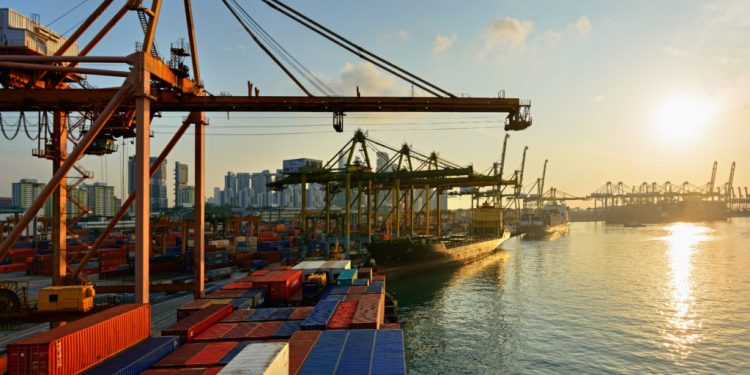The Sea Transport Industry Transformation Map (ITM) kicked-off today (12 January 2018) to build on long-term strategic plans to develop Singapore’s next-generation port and strengthen the nation’s position as an international maritime centre (IMC).
Senior Minister of State for Transport and Health Lam Pin Min launched the ITM at a cocktail event organised by the Singapore Maritime Foundation.
Along with the ITM, five partnership agreements were signed between the Maritime and Port Authority of Singapore (MPA) and tripartite partners to help drive innovation, productivity and workforce development.
Unions were involved in two of the agreements. They include the National Transport Workers’ Union (NTWU), Singapore Port Workers’ Union (SPWU) and the Port Officers’ Union (POU).
Currently, the maritime industry contributes 7 per cent of Singapore’s GDP and employs over 170,000 people.
According to MPA, the ITM aims to create 5,000 new jobs as well as grow the sector’s value-add by $4.5 billion. It added that workers currently in traditional job roles will undergo skill upgrading as jobs transform with increasing automation and technology.
Human Capital Development
Under the five-year agreement between MPA, Jurong Port and NTWU, the three parties will work together to build port employees’ competencies. This will be done through internships, work-study programmes and overseas training attachments.
They will leverage the Jurong Port Academy to deliver technical training to workers and groom future industry leaders in preparation for the upcoming Next Generation Multipurpose Port.
MPA will also be working with SPWU, POU and PSA Corporation Limited to equip port employees with new competencies, and attract youth and mid-career switchers to join the port sector. It will also continue to develop existing initiatives such as the Earn and Learn programme for seafarers and port operations executives launched in 2016.
National Trades Union Congress (NTUC) President Mary Liew said: “The maritime industry is a diverse and dynamic one that provides many opportunities for our working people to pursue meaningful careers. With the industry changing at such a rapid pace, it is critical that workers constantly reskill and upskill themselves to remain relevant and future-ready.
“The Labour Movement is committed to working closely with our tripartite partners to ensure our workers have the right skills to support growth in the maritime industry as well as deliver concrete action plans to realise the benefits of the ITM for our working people.”
Enhancing Productivity and Innovation
As part of the ITM, MPA will also collaborate with NUS-Enterprise to execute the Maritime Technology Acceleration Programme that aims to attract local and international tech start-ups.
The programme involves an annual competition called the Smart Port Challenge where start-ups work to tackle real-life challenges in the industry.
Another initiative will see MPA, Singapore Customs and the Singapore Shipping Association work together to digitise trade and maritime documentation in the industry.
Innovation will remain essential as Singapore develops future capabilities and solutions that build on emerging technologies from Industry 4.0, said MPA Chief Executive Andrew Tan. Some of these include autonomous systems, robotics, data analytics and artificial intelligence.
He added that MPA will support companies to embark on innovation and productivity-driven growth by putting in place an “enabling environment and infrastructure”.
Strengthening Connectivity
Meanwhile, MPA said that Singapore will continue to improve its international maritime centre cluster to enhance its long-term competitiveness and value to shipping companies and maritime service providers.
To sustain Singapore’s competitive advantage, the nation will continue to strengthen links with adjacent sectors such as commodity trading, logistics and e-commerce, said MPA. It will also continue to work with other international maritime clusters through stronger business ties, and further collaborate on research and development, training and education.
MPA’s Mr Tan said: “Like many other industries, the maritime industry faces both external and domestic challenges brought about by keener competition, fundamental shifts in the industry, the advent of new technologies, and constraints in our land and manpower resources.
“However, there are other developments which present new opportunities for our industry … The launch of the Sea Transport ITM is hence timely and necessary in view of the various challenges taking place both globally and regionally … While there are many positive things working in our favour, we cannot be complacent.”

